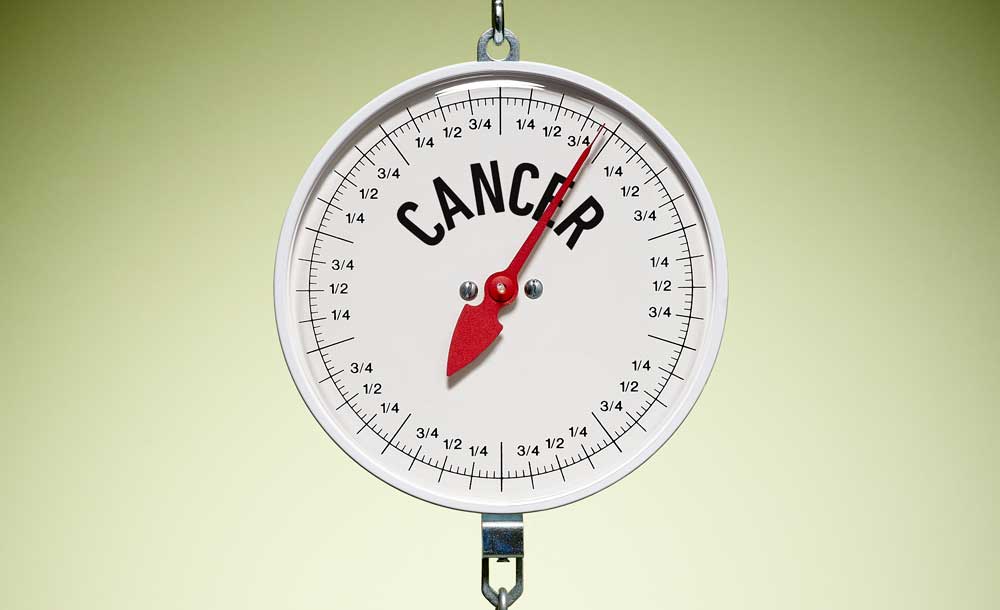
Can Your Weight Affect Your Risk of Getting Cancer?
-
Millions of Americans know the risk factors associated with being overweight or obese: diabetes, stroke, heart disease, high blood pressure — but what about cancer? For many, cancer has never been a part of this conversation.
Though not always discussed in the doctor’s office, more and more studies have shown that weight and obesity are linked to cancer. In April 2016, the World Cancer Research Fund International reported in its Continuous Update Project that about one-third of the most common cancers could be prevented with diet, weight management, and physical activity. The project also revealed that physical activity reduced the risk for colon, endometrial, and breast cancer in postmenopausal women.
“Being overweight can increase the risk for numerous cancers. In nonsmokers, around 20 percent of all cancers could be attributed to being overweight or obese,” said Ed Giovannucci, MD, professor of nutrition and epidemiology at the Harvard T.H. Chan School of Public Health.

The cancers most commonly associated with obesity are breast, endometrial, colon, kidney, liver, esophageal, pancreatic, and aggressive prostate cancer.
Of all the cancers linked to being overweight, breast and endometrial cancers have the strongest association. Pointing to the higher levels of estrogen in overweight women and higher insulin growth factor, the connection between weight and endometrial cancer is clearer than with breast cancer. “It’s been a difficult field to study,” said Mary B. Daly, MD, chair of clinical genetics and director of the Risk Assessment Program at Fox Chase Cancer Center.
Gaining weight after cancer treatment can increase the chances for cancer recurrence, which is another challenge for patients. On average, women with breast cancer gain about 15 pounds throughout treatment, according to Daly. “I tell patients to try not to gain weight after therapy, menopause, or breast cancer,” she said.
Though it is ideal to maintain weight within the normal range, not gaining additional weight is also helpful. “If people find it difficult to lose weight, they should not give up and gain even more,” Giovannucci said. “While diet and exercise are important for weight control, they have additional benefits. An overweight person who maintains some level of activity and a good diet is much better off than an overweight person who is completely sedentary and has a poor diet.”
For some patients, adopting a healthy lifestyle after a cancer diagnosis can be helpful in losing and maintaining weight. Though research in the field is still early, basic factors like diet, exercise, and avoiding smoking and excessive alcohol consumption may prove beneficial to a patient’s prognosis. “For some cancers with a relatively good prognosis such as early-stage breast cancer or prostate cancer, the patient may actually be more likely to die of other causes such as heart disease, and the lifestyle factors definitely help in that regard,” Giovannucci said.
The conversation regarding patients and their weight can be very touchy, but it is necessary, according to Crystal S. Denlinger, MD, chief of gastrointestinal medical oncology at Fox Chase. “It’s hard to say to a patient that the risk factor for your cancer is your weight,” she said.
The No. 1 cause of death in cancer survivors, other than cancer, is cardiovascular disease, and being overweight or obese can increase that risk, according to Denlinger. “It’s important to maintain a healthy lifestyle — not only for cancer risk, but for overall health.”
Dietary changes are not unusual for patients who are undergoing chemotherapy, according to Denlinger. “How patients approach food changes: treatment alters the sense of taste and appetite,” she said. Though some patients may experience weight loss, others may gain weight. Better chemotherapy drugs mean there are now less severe adverse effects.
Other patients struggle with weight issues due to adverse side effects from life-saving medications or surgeries.
As research into the connection between weight and cancer progresses, doctors are exploring how to get the message across to their patients. “We need to let the world know that weight matters for a lot of different diseases,” Denlinger said. “We need to work on weight management before, during, and after a cancer diagnosis.”
